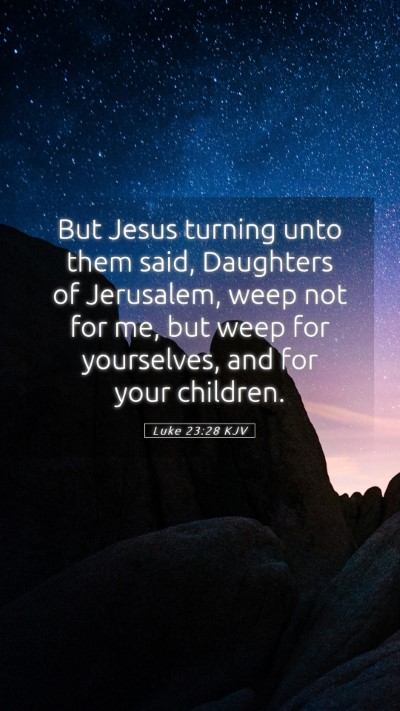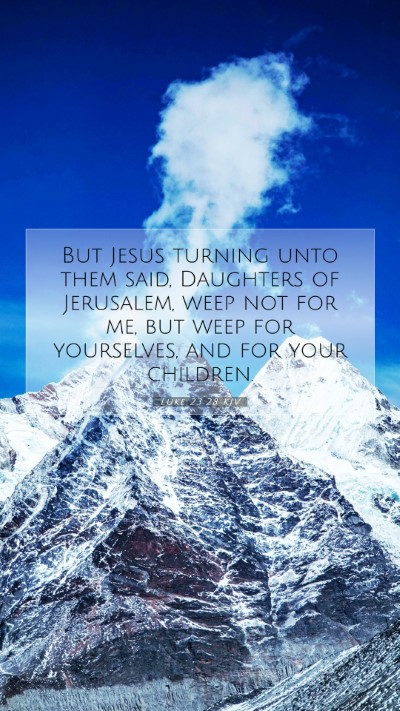Understanding Luke 23:28
Bible Verse: Luke 23:28
"But Jesus turned to them and said, 'Daughters of Jerusalem, do not weep for me; weep for yourselves and for your children.'" (NIV)
Introduction
Luke 23:28 presents Jesus at a pivotal moment during His path to crucifixion. This verse captures a profound yet somber message that invites deeper reflection on the broader implications of His suffering and the suffering of others. The following analysis compiles insights from noted public domain commentators such as Matthew Henry, Albert Barnes, and Adam Clarke, providing a comprehensive scripture analysis that enhances our understanding of this verse.
Contextual Background
The setting of Luke 23:28 is crucial for understanding its meaning. Jesus is on His way to be crucified, accompanied by a large crowd, including mourners known as the Daughters of Jerusalem. This moment encapsulates Jesus' concern not only for His fate but also for the future of Jerusalem and its people.
Commentary Insights
-
Matthew Henry:
- Henry emphasizes Jesus' selflessness. Instead of inviting pity for Himself, He redirects the mourners' focus towards their own spiritual state and that of their children.
- He interprets this as Jesus' understanding of the impending judgment on Jerusalem and the consequences for those who reject Him, urging a focus on repentance and awareness of their predicament.
-
Albert Barnes:
- Barnes notes the compassion of Christ, highlighting that though He faced suffering, He prioritized the well-being of others.
- He explains that His exhortation not to weep for Him signifies the need to acknowledge the realities of sin and the coming tribulations, advocating for inward reflection rather than external display of grief.
-
Adam Clarke:
- Clarke relates this verse to prophecies about Jerusalem's destruction, suggesting that Jesus in His prophecy reveals the futility of worldly sorrow if it doesn’t lead to repentance.
- He stresses that the tears shed for Jesus are misplaced; the real matter of concern should be for themselves and their children, symbolizing the generational consequences of disobedience to God.
Thematic Analysis
Luke 23:28 highlights several significant themes that resonate throughout the Bible:
- The Suffering of Christ: Jesus’ acknowledgment of His pains juxtaposed with the sufferings of others emphasizes His role as the Suffering Servant and connects to Isaiah's prophecies.
- Repentance: The call to weep for themselves signifies a profound need for a repentant heart. This ties in with the biblical principle that repentance leads to salvation.
- Consequence of Sin: The mention of children evokes the notion of the consequences of sin being generational, calling attention to social and spiritual responsibilities.
Application of the Verse
This verse can be reflected upon in various life applications:
- Personal Reflection: Believers are encouraged to examine their hearts and lives, contemplating how their actions may impact their lives and those around them.
- Community Awareness: There is a call to intercede for communities, recognizing the implications of collective sin and the value of seeking God’s mercy.
- Understanding Suffering: This verse invites believers to reshape their views on suffering, reminding them of the importance of compassion and the expected trials of growing in faith.
Bible Cross References
- Matthew 23:37-39: A lament over Jerusalem's rejection and the resulting consequences.
- Luke 19:41-44: Jesus weeps over Jerusalem, foreseeing its destruction due to unrepentance.
- Isaiah 53:3-5: Prophecy describing the suffering of the Messiah.
- Jeremiah 9:17-20: A call to mourning for the people of Jerusalem concerning their sins.
- Romans 9:2-3: Paul’s sorrow for his fellow Israelites, emphasizing the weight of spiritual loss.
Conclusion
In Luke 23:28, we find a poignant reminder of the necessity of self-examination and community concern in light of impending judgment. Jesus’ words resonate as a call to deeper repentance and awareness. Through this combined commentary from respected biblical commentators, we gain keen insights into the deeper implications of this verse, fostering an enriched understanding of Scripture.


